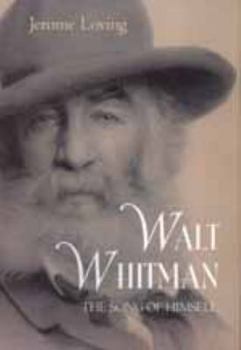Walt Whitman: The Song of Himself
Select Format
Select Condition 
Book Overview
Walt Whitman: The Song of Himself is the first full-length critical biography of Walt Whitman in more than forty years. Jerome Loving makes use of recently unearthed archival evidence and newspaper... This description may be from another edition of this product.
Format:Hardcover
Language:English
ISBN:0520214277
ISBN13:9780520214279
Release Date:March 1999
Publisher:University of California Press
Length:582 Pages
Weight:2.75 lbs.
Dimensions:1.9" x 6.4" x 9.2"
Customer Reviews
4 ratings
From a Former Student
Published by Thriftbooks.com User , 17 years ago
I took a Whitman seminar from Dr. Loving, and this was our textbook. It is very dy, and very full of detail. I love Whitman's work, and reading this biography really helped me understand more about it.
The good gray poet of Camden
Published by Thriftbooks.com User , 20 years ago
The poet died in 1892. In life he became notorious and a positive influence on the reformers of the day. The author states he supplied the model for the count in Bram Stoker's DRACULA. The first edition of LEAVES OF GRASS was 1855, the last 1881. Whitman was not as solitary as previously assumed. For the poet the Civil War became a marriage ceremony of sorts. At forty three Whitman was too old for the rigors of combat. In 1862 Whitman went to the front in search of his brother George. Subsequently traveling to Washington D.C. he began his career as a wound dresser. Whitman immersed himself in the pathos of the terrible struggle. Whitman's capacity to love was the dynamo of LEAVES OF GRASS. He was a former printer, second son in the family. Whitman's ancestry was essentially Dutch and English. He concluded his formal schooling at age eleven. Between 1836 and 1841 Whitman taught at eight district schools on Long Island. By 1855 Whitman had read Emerson. In 1840 he made the prophetic announcement that he was thinking of writing a book. The tone of Whitman's early writings is moralistic. Whitman wrote a temperance novel entitled FRANKLIN EVANS. Whitman was a privte poet who made public his boundless affection for the one in the many. Whitman was no New England reformer. His utopia was not an agrarian retreat. In the 1840's Whitman dressed in a conventional way. Whitman loved Indian names and thought the nation was losing something through its policy of Indian removal. At the same time he had Darwainian confidence that the Indians faced extinction. Whitman was appalled by capital punishment. He saw the matter within the context of the haves and the nave-nots. The Bible was an influence later on his poetry. Whitman was editor of the BROOKLYN EAGLE 1846-1848. Whitman saw slavery as a social evil. He never became an abolitionist in a political or formal sense. Whitman lost his job and traveled south to New Orleans. He worked at the CRESCENT but later separated from that publication possibly by mutual agreement. His favorite poet was William Cullen Bryant. It may have occurred to him at this time that he was wearing out his opportunities in journalism. Travel beyond Long Island and New York City had fed his imagination at least. Whitmam, a product of "charity schooling", was socially and economically different from Emerson and others. Whitman was involved in Free-Soil politics. He became the editor of the FREEMAN. As the paper adopted a softer tone, Whitman was pushed out of the editorial office. LEAVES OF GRASS began to take shape in his mind in the 1850's. Parallels abound between Emerson's first two collections of essays and Whitman's first three editions of LEAVES OF GRASS. Whitman was interested in problems of democracy and the development of genius. He probably heard or knew of Emerson's address "Natural Aristocracy." Whitman was awash in romantic ideas about art and the artist.Whitman's favorite composers
Most comprehensive, and least theory-ridden Whitman Bio.
Published by Thriftbooks.com User , 23 years ago
In this latest biography of quite possibly the most important American poet, Jerome Loving takes on a Herculean labor: to present the facts about a man who endeavored to create himself as an icon, and who has been taken up by a dozen causes and ideologies as one of their own (some have regarded Whitman as a religious figure on par with Christ, a homosexual liberator, or a proto-communist). The result of a great deal of combining and comparing, winnowing opinion, propaganda, and rumor, is a cautious, complex, and detailed view of the facts of Whitman's life. On the issues currently 'hot' in debate about the poet (his homosexuality or lack thereof, his attitudes towards immigrants, women, and African-Americans), Loving doesn't succumb to the temptation to either sanctify his subject or make him simply a partisan of the current opinions, but rather weighs and presents the evidence in as close to an impartial manner as I've seen. The lack of a simplistic, overarching narrative to Loving's life of Whitman (the kind of narrative found in many other bios) is true to the facts of life and scholarship--sometimes we can't know. I've found this book scrupulously up-to-date; it corrects many factual errors found in earlier Whitman bios. It is required reading for any Whitman scholar, and a good read as well for those interested in knowing more about the Good Grey Poet than his poems tell us by themselves.
"I felt as if I was by the poets side each and every moment.
Published by Thriftbooks.com User , 24 years ago
After reading Loving's book on Whitman it only enhanced my spirit to read and analyze more of this Poet's life and poetry. I decieded to write about Whitman in my class at college and used Loving's book as a research means together with other books form the university library. I feel as if I know more about good "Old Walt" then I do my own family. This was truly a good read. Enjoy!!!





